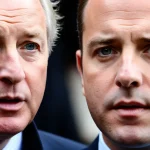Government Initiatives to Revive UK Tourism
National efforts center on comprehensive UK tourism recovery plans designed to reboot the sector following pandemic disruptions. The government has launched strategies that blend financial backing with regulatory support to restore confidence and stimulate visitor numbers. These post-pandemic strategies outline phased approaches, aiming for a robust tourism rebound over the coming years.
VisitBritain and associated national bodies play pivotal roles, steering campaigns and coordinating resources to support local businesses. Their initiatives focus on enhancing destination appeal and ensuring consistent messaging to both domestic and international audiences. By aligning marketing with recovery objectives, these agencies help stabilize the sector.
In the same genre : How are British Media Outlets Addressing Changes in Politics?
The timeline of recovery programs typically spans immediate relief measures, medium-term marketing drives, and longer-term infrastructure investments. This includes minimizing bureaucratic hurdles, facilitating digital transformation, and supporting sustainable tourism development. These efforts collectively reinforce the government actions underpinning UK tourism revival, demonstrating a commitment to rebuilding an industry vital for the UK economy.
Financial Support and Funding Schemes
The UK government has prioritized financial aid to stabilize the tourism sector amid ongoing challenges. Key tourism industry grants focus on sustaining small and medium enterprises (SMEs), which form the backbone of local tourism economies. These grants help cover operational costs and adapt businesses to changing market conditions.
Also to read : How is climate change impacting the UK’s infrastructure?
In addition, the government has extended and tailored support measures including furlough and job retention schemes to protect employment within the tourism sector. These adaptations acknowledge the sector’s uneven recovery trajectory, offering flexible assistance aligned with business reopening phases.
Targeted tourism industry grants aim to promote investment in digital technologies and sustainable practices, fostering long-term resilience. For instance, businesses investing in contactless payments or eco-friendly operations often qualify for specific funding streams.
By prioritizing a comprehensive package of financial aid, combining direct grants with wage support, the government seeks to alleviate financial pressures and enable tourism enterprises to survive and prepare for growth. This multifaceted funding approach complements broader post-pandemic strategies ensuring economic support matches operational and market realities.
Marketing and Promotion Campaigns
Effective tourism marketing is crucial to boost visitor numbers in line with government plans. The government’s Britain campaign acts as a flagship promotional effort to rekindle interest among both domestic and international tourists. This high-profile initiative leverages traditional media alongside expansive digital platforms, targeting market segments with tailored messaging.
Post-pandemic, rebranding efforts emphasize safety, accessibility, and the diversity of UK destinations. Digital marketing campaigns utilize data analytics to optimize engagement, focusing on interactive content and virtual experiences. These tools help sustain tourist interest amid fluctuating travel conditions.
Collaborations with travel influencers and media outlets amplify these campaigns, providing authentic, localized perspectives that resonate with potential visitors. This strategy enhances credibility and encourages spontaneous travel decisions.
Together, these tourism marketing initiatives align closely with broader UK tourism recovery plans, ensuring sustained attention and momentum. By balancing wide-reaching content with targeted outreach, the government aims to rebuild a robust visitor base, crucial for economic recovery.
Consistent reinforcement of the Britain campaign and related promotions maintains UK’s competitive edge as a travel destination, capitalizing on new travel trends shaped by post-pandemic realities.
Health and Safety Protocols for Tourists
Ensuring travel safety measures is central to restoring confidence in UK tourism. The government, alongside industry bodies, has implemented stringent COVID-19 guidelines to safeguard both visitors and service providers. These protocols include mandatory sanitization practices, social distancing mandates, and mask usage policies, particularly in crowded or enclosed spaces.
A key element is the introduction of the “Good To Go” accreditation scheme, certifying businesses that comply with official health and sanitation standards. This program offers tourists tangible assurance of safety, promoting informed choices when selecting accommodations and attractions. The scheme has been widely adopted across the sector, enhancing transparency and consistency in safety practices.
Clear and ongoing communication of travel safety measures through official channels and tourism marketing campaigns ensures visitors remain well-informed of current requirements. This transparency is vital for maintaining trust, especially given the dynamic nature of pandemic-related guidance.
Together, these efforts form a core part of the post-pandemic strategies designed to rebuild UK tourism by prioritizing health without compromising visitor experience. By aligning government actions with industry compliance, the sector advances toward a sustainable and confident reopening phase.
Strategic Partnerships and Industry Collaboration
Strategic tourism partnerships are vital components of the UK’s approach to rebuilding its travel sector. Effective sector collaboration involves aligning national and regional tourism boards, which ensures cohesive messaging and resource sharing. This cooperation strengthens the impact of post-pandemic strategies by uniting efforts across diverse regions.
Significant public-private initiatives bridge government actions with industry expertise. Partnerships with airlines, hotels, and attractions create integrated travel experiences, smoothing visitor journeys and enhancing satisfaction. Such collaboration also supports coordinated marketing and aligned safety protocols, amplifying sector-wide benefits.
Joint work with international travel organisations fosters knowledge exchange and opens new tourism markets, further accelerating recovery. These partnerships help the UK respond to evolving traveler preferences with agility.
By fostering multi-level cooperation, tourism partnerships deliver a comprehensive framework that supports the wider objectives of the UK tourism recovery plans. This collaborative model not only accelerates immediate resurgence but also builds a stronger, more connected tourism ecosystem prepared for future challenges.
Measurable Outcomes and Future Targets
Early assessments of tourism recovery targets reveal progress aligned with government expectations. Data indicates a steady increase in visitor numbers, with domestic tourism showing particular resilience. International arrivals, while recovering more gradually, benefit from ongoing post-pandemic strategies aimed at easing travel restrictions and enhancing destination appeal.
Key industry growth metrics include occupancy rates, tourism-related employment, and visitor spending. These indicators provide tangible evidence of sector revival and help track the impact of government actions. For example, employment figures in tourism-related roles have shown gradual improvement, reflecting the effectiveness of support measures.
Projections anticipate continued growth in both domestic and international markets over the coming years. Long-term tourism recovery targets focus on sustainable expansion, emphasizing ecological considerations alongside economic gains. Plans also include further digital integration and innovation, ensuring resilience against future disruptions.
Monitoring these measurable outcomes enables policymakers to refine strategies and allocate resources effectively. By linking results with ambitions, the UK tourism sector aims to build a robust, adaptable future, supported by clear and achievable targets.




